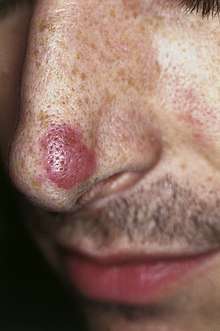Peau d'orange
Peau d'orange (French for "orange peel skin" or, more literally, "skin of an orange") describes anatomy with the appearance and dimpled texture resemble an orange peel. Peau d'orange is caused by cutaneous lymphatic edema, which causes swelling. However, some parts of the edematous skin is tethered by the hair follicles and the sweat glands such that it cannot swell, leading to an appearance like orange skin. Occasionally, the same phenomenon is seen over a chronic abscess. Examples include the skin of the breast in inflammatory breast cancer, in the eye due to breaks in Bruch's Membrane called angioid streaks, which are common in pseudoxanthoma elasticum, or in elephantiasis caused by thread-like, microscopic parasitic worms (filariasis). Peau d'orange can be also seen with myxedema of Graves' disease, where the term refers more to the texture than the color.
